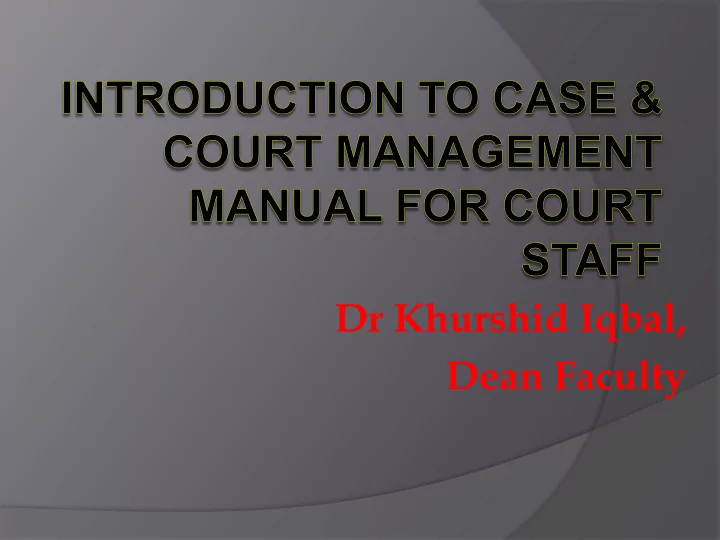

Dr Khurshid Iqbal, Dean Faculty
Significance of Court Staff No court without staff Ministerial support to Judge at every stage of judicial proceedings Staff essential for overall performance of justice system Skilled, efficient, honest and dedicated staff—a must Ensures quality; quick disposal No worthwhile training for staff
Why Training for Court Staff? Growing concern about courts capacity building—at home and abroad Rising expectations of public from courts Expectations: service delivery; accountability Judiciary’s sense of self-accountability Inward looking approach; creation of learning opportunities; self-reporting; public outreach (newsletters, reports, press releases) Recognition of need of professional development; new skills, techniques, trends
Key performance standards Genuine expectations from court staff Public and institutional demand for quality performance of staff Key performance standards Access to justice; quick disposal of case/any matter within staff’s competency; timeliness; equality & fairness; integrity; accountability; gender sensitive; public confidence; contribution to judicial independence; basic know how of rules & practice
Key benefits of staff training Spirit of public service Continuing formal training inculcates a spirit of public service Others (the list below is non-exhaustive) Increase level of individual and institutional performance—high productivity Greater public satisfaction; public confidence Cost effective & time saving; inexpensive/quick Better service delivery: understanding and addressing the pain of the litigants
Key training areas Limitation of manual: a note of caution! Court staff is of different categories. Specialized curriculum for each category, at this early stage, seems to be costly and difficult. However, it may be developed over a period of time. To economize time and resources, the present manual was prepared keeping in view the similarities and commonalities in the job descriptions of different categories.
Key training areas… Judicial/official ethics & integrity Court administration & case management/process Organization of case file (case filing system with proper management) Service of court process, record room Secretarial work and support Client service/public relations Financial: fee & fine; accounts,services laws Enforcement of court orders/execution
Objectives of the manual Sensitization to relevant job description Each category must know its relevant duties & responsibilities Enhancement of skills E.g. Reader (daily diary); Muharrir (maintenance of record; issuance of process, etc); Stenographer (preparation of orders); Computer operator (preparation & maintenance of statistical data), etc Delay reduction Timely performance helps reduce delay
Objectives… Improvement in service delivery The manual to improve services delivery Making them litigant-friendly To ensure professional development to bring about attitudinal change Enhancement of public confidence Efficiency of court staff helps enhance public confidence
Categories of staff 1. Superintendent to the D&SJ 2. Clerks including English clerk 3. Stenographers & Computer Operators 4. Readers of the Courts 5. Nazir & Civil Nazir/Accountants 6. Copying supervisor, clerk agent, copyist 7. Examiner, sweepers,drivers, 8. Muharrir 9. gardners 10. Bailiff and Process server 11. Naib Qasids/ Chowkidars
Superintendent/Clerk of court Key areas of training Drafting official letters, case institution Taking notes, protocol, including PR, Preparation of note sheets Maintenance of character rolls of staff Submission of PER form to reporting officers Preparation of duty roaster of staff Maintenance of different registers Distribution of agenda for meetings Maintenance of record
Superintendent/Clerk of court Group activity A letter has been received from the Registrar, Peshawar High Court, asking for progress in the construction of a Record Room in the District Courts. Group A. Describe the official procedure required to be adopted on receipt of the letter. Group B. Put up the letter to the District & Sessions Judge on a proper note sheet, Group C. Prepare a draft reply, Group D. Adopt the next procedure, following the approval.
Stenographer/Computer operator Key areas of training Short hand Dictation of orders and judgments Computerized statistical data Preparation of automated cause list Preparation of monthly statements Preparation of inspection notes Expert use of computer and data protection
Reader Key areas of training Preparation of daily cause list Maintenance of daily diary Maintenance of all relevant registers Scrutiny of plaint, appeals, revision, etc Issuance of parcha peshi, Fine Reconciliation Faisla bahi
Nazir/Accountant Key areas of training Maintenance of signature record of all Judge Preparation of pay & TA bills Preparation of contingency bills Maintenance of relevant registers Maintenance of accounts Preparation of budget Court Assets
Copying supervisor, agent, clerk, copyist Key areas of training Maintenance of receipt book for copies Keeping of accounts of receipts Keeping of receipts of issuance of copies Proper maintenance of application of copies Sanctioning of applications for copies Keeping of all the files in lock Maintenance of register in form CD-8 Maintenance of accounts of copying branch
Examiner Key areas of training Revising the copies Examining the copies Certifying the copies Stamping the copies Paginating the copies Endorsing the copies Cancellation of defective copies Supervising the copyist Producing the copies
Muharrir Key areas of training Registration of cases in relevant registers Preparation of checklist for cases Preparation and issuance of process Preparation of different forms Maintenance of court record Preparation of different statements Maintenance of chronological list of cases Keeping files in tidy condition Maintenance of different registers Consignment of cases to record room
NaibNazir Key areas of training Noting the particular of every process issued Maintenance of relevant registers Payment of diet money to official witnesses Custody of different registers
Bailiffs/Process servers Key areas of training Writing report of service on summons/warrant Serving court process Execution of court warrants Attachment and sale of property in execution of decree
Recommend
More recommend